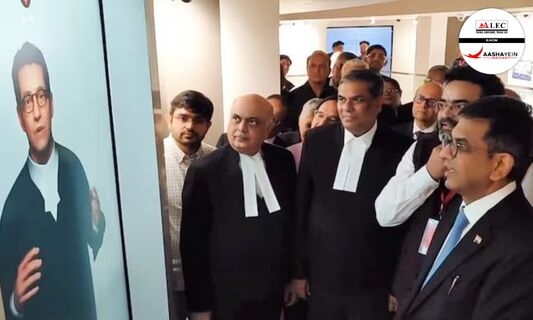CJI Questions AI Lawyer on the Constitutionality of Death Penalty
Chief Justice of India (CJI) DY Chandrachud recently engaged in a remarkable interaction with India’s Artificial Intelligence (AI) lawyer, sparking an insightful discussion on the constitutionality of the death penalty. This exchange, took place during the inauguration of the National Judicial Museum, New Delhi underscored a transformative moment for the role of technology in the judiciary.
CJI’s Question on the Constitutionality of the Death Penalty
At the National Judicial Museum’s opening, CJI Chandrachud posed a thought-provoking question to the AI lawyer: “Is the death penalty constitutional in India?” This inquiry touched upon one of India’s most complex legal issues. The CJI’s intent was to assess whether the AI could accurately interpret this critical topic within the framework of Indian law. Over the years, the death penalty has stirred considerable debate regarding its morality, effectiveness, and constitutional validity.
You can also read the latest judgment by visiting [Latest Judgment]
For more information, visit [Aashayein Enquiry Section]
AI Lawyer’s Response to Capital Punishment
The AI lawyer, represented as a virtual advocate in formal attire, gave a comprehensive answer, stating that the death penalty is constitutional in India. However, the AI highlighted that its application is limited to the “rarest of rare” cases. This doctrine, established by the Supreme Court, restricts the death penalty to crimes of an extraordinarily heinous nature. According to the AI, this limitation aligns with India’s judicial stance, ensuring that capital punishment is imposed only when the crime’s gravity necessitates the highest form of retribution.
The AI’s response impressed CJI Chandrachud, as it aligned with established legal principles and demonstrated a nuanced understanding of the doctrine. This response suggested that AI could potentially play a supportive role in judicial analysis by providing clear interpretations of complex legal standards.
Implications of AI in the Judicial System
This interaction illustrated AI’s potential to assist the judicial process by delivering timely, accurate interpretations of legal principles. AI can play a valuable role in legal research, case analysis, and routine legal inquiries, augmenting human judgement. The incorporation of artificial intelligence has the potential to significantly transform the Indian Judiciary. In this context, an AI-powered legal translation system was introduced in 2023 to enhance the accuracy of translations and contribute to the overall efficiency of the Indian Judicial System.
However, this also raises questions about the ethical and practical boundaries of AI’s involvement in legal proceedings. While AI is capable of interpreting laws based on data, it lacks the moral judgement, empathy, and human experience essential to judicial decision-making. As such, AI may assist judges, but the responsibility for well-rounded, ethically sound decisions will remain with human justices.
The "Rarest of Rare" Doctrine: A Brief Overview
The “rarest of rare” doctrine referenced by the AI is a significant legal standard that limits the death penalty in India to only the most extraordinary cases. The Supreme Court established this doctrine to curb the arbitrary application of capital punishment, ensuring that it is reserved for instances where no other response would satisfy the public’s sense of justice. This doctrine balances justice administration with respect for human rights, acknowledging the irreversible nature of the death penalty. The doctrine was incorporated in the case of Bachan Singh v. the State of Punjab (1980) where the Constitutional bench of the apex court held that death penalty should be awarded only when there is no alternative present.
Crimes falling under this category include acts of severe brutality, terrorism, and extreme cruelty. The AI’s accurate interpretation of this doctrine reflects its alignment with fundamental judicial values, suggesting that it is programmed to interpret complex legal concepts with clarity.
Closing Words
The interaction between CJI Chandrachud and AI lawyer marks a symbolic and practical milestone in India’s judicial history. The AI’s informed response not only showcased its grasp of Indian legal principles but also illuminated the increasing role of technology within the judiciary. As AI continues to evolve, it could enhance judicial efficiency, especially in research and procedural analysis. However, human judgement will remain paramount in cases requiring ethical insight.
This landmark interaction signals a blend of tradition and technology in the Indian legal landscape, paving the way for innovations that will support the judiciary while respecting the core principles of justice

